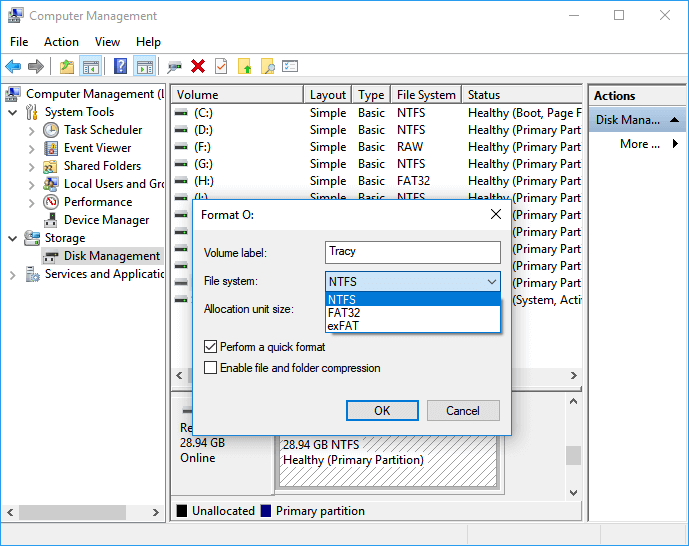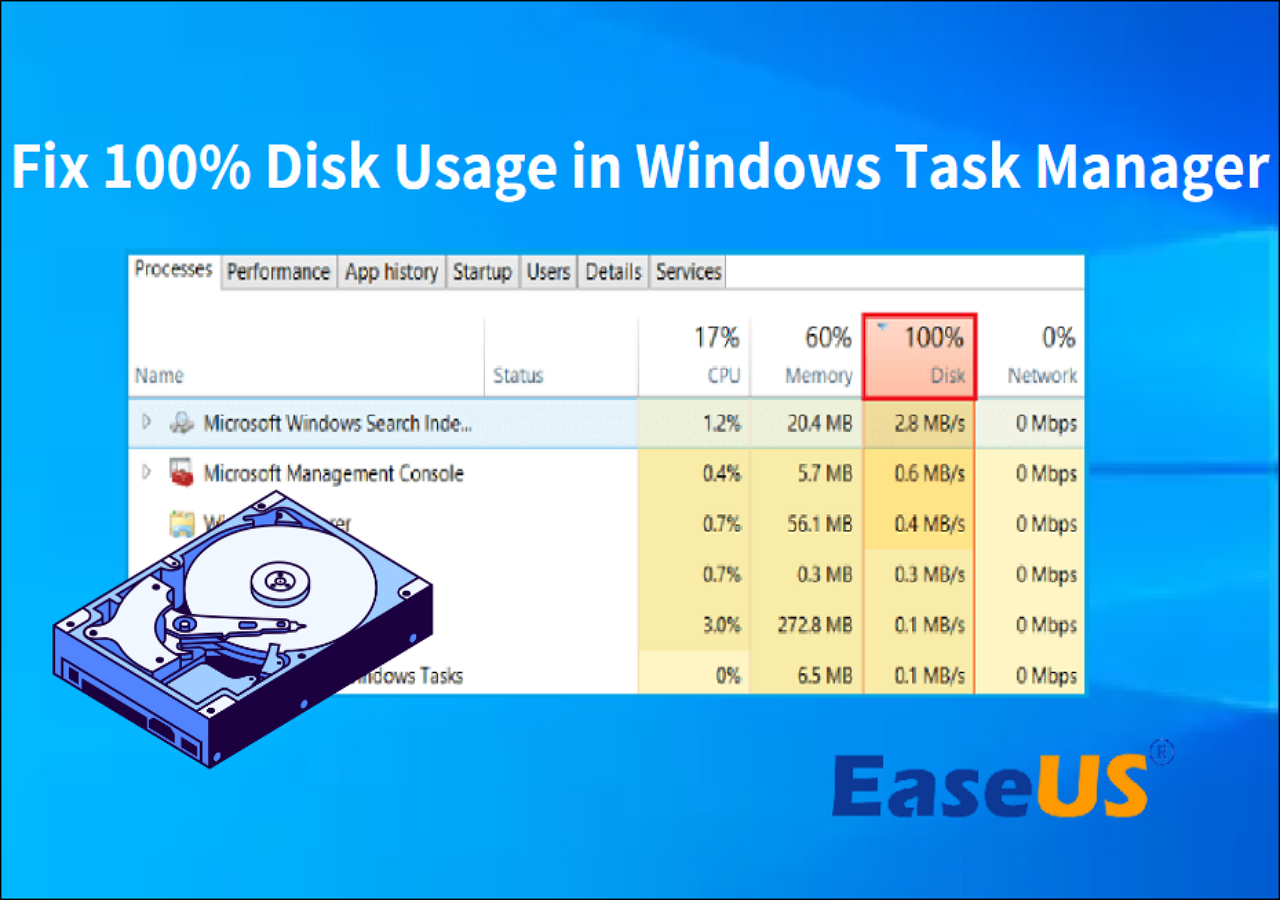Page Table of Contents
About the Author
Hot Topics
Updated on Aug 22, 2024
"About two weeks ago, my Windows 10 failed to boot due to unknown reasons; then I took the advice which asked me to make my USB bootable to repair the system. Now the problem is fixed, and I want to convert the pen drive back to normal. Does anyone know how to do it?"
EaseUS will provide a versatile and powerful disk manager, EaseUS Partition Master, and other solutions to assist you in formatting bootable USB.
How to Format Bootable Pendrive - 4 Ways
Creating a USB bootable disk can help you enter the WinPE environment when the Windows system fails and prevents you from booting the PC. When you succeed, you may want to restore the bootable USB to normal so that you can use it as an external storage media. Fortunately, formatting a bootable pendrive can make it a normal USB. Here, we have listed 4 effective methods, and you can choose the most suitable one.
- Method 1 - Format Bootable Pendrive Using EaseUS Partition Master
- Method 2 - Format Bootable Pendrive with File Explorer
- Method 3 - How to Convert Bootable Pendrive to Normal - Disk Management
- Method 4 - Format Bootable Pendrive to Normal Using Diskpart
- Tip
- Before starting, make sure that you have set your PC hard drive as the first boot device in BIOS, and then insert the bootable USB drive into your Windows PC.
Method 1. Use EaseUS Partition Master - Easy and Safe
To fix "how to format a bootable USB," the most common methods are using Windows built-in Disk Management and Diskpart. These two methods require users to be familiar with the command prompt, which is a bit difficult. If you are a novice, here we'd like to recommend an easy and handy tool - EaseUS Partition Master.
Download EaseUS Partition Master now, and follow the detailed steps below to format the bootable USB.
Step 1. Select the USB drive to format.
Connect the USB drive or pen drive to your computer. Download and launch EaseUS partition software. Right-click the USB drive you intend to format and choose "Format".
Step 2. Set the drive letter and file system on USB.
Assign a new partition label, file system (NTFS/FAT32/EXT2/EXT3/EXT4/exFAT), and cluster size to the selected partition, then click "OK".
Step 3. Check "Yes" to confirm formatting USB.
Click "Yes" if you see the Warning window. If you have important data on it, back up the data in advance.
Step 4. Apply the changes.
Click the "Execute 1 Task(s)" button first, and then click "Apply" to format the USB drive.
Key features of EaseUS Partition Master:
- Easy Operation. Formatting a bootable USB in four simple steps and requires no command-line knowledge.
- Sustainable Use to Manage Partitions. It supports you in resizing, merging, cloning, and formatting partitions effortlessly.
- Partitions Converter & Wizards. Efficient MBR/GPT converter, Primary/Logical converter, Dynamic/Basic convert.
- 100% Safe. Approved by authorized agencies like PCWorld, Softonic, Tech Advisor, etc.
You can also use this tool to convert bootable USB back to normal:
How to Convert a Bootable USB Drive to Normal【2024 Guide】
In this post, you will discover four feasible ways to restore a bootable USB back to normal without losing capacity.

Method 2. Use File Explorer
File Explorer is a universal method for formatting a bootable USB drive on Windows 10/11. Its familiarity and compatibility generally make it a solid choice.
Here's how to format bootable pendrive to normal:
Step 1. Press Windows + E keys to open File Explorer. Go to the This PC section, find and right-click the bootable USB flash drive, and choose "Format".
Step 2. Select the file system as NTFS or FAT32 and select the allocation size. You can also restore the USB to its default settings by clicking "Restore Device Defaults".
Step 3. Click "Start" to format the bootable pendrive to its normal state.

Don't hesitate to share this article to let more users know how to restore a bootable USB to normal using File Explorer.
Method 3. Use Disk Management
In Disk Management, you can also format the USB. Right-click the bootable drive and choose "Format." Then, follow the prompt to complete the formatting. Here are the detailed steps for performing the bootable pendrive format:
Step 1. Click Start in the Run box, type diskmgmt.msc, and press "Enter" to start the Disk Management tool.
Step 2. Right-click the bootable drive and select "Format."
Step 3. Type a label to quickly identify the flash drive in the "Volume label" field.
Step 4. Select the proper file system, and click the "OK" button to continue.

Method 4. Run Diskpart
If you are familiar with the command prompt - built-in Windows 11, Windows 10, and Windows 7/8/8.1, then Diskpart is another method you can apply. Below are the detailed steps.
Step 1. Click Start in the Run box, type diskpart, and press "Enter" to start the diskpart command prompt.
Step 2. Type the following commands and press "Enter" after each move.
list disk
select disk X (replace X with the disk number of your bootable USB drive)
clean
create partition primary
assign drive letter=G (replace G with the desired drive letter to your pendrive)
format fs=fat32 quick or format fs=ntfs quick (select one file system based on your own needs)
exit

After completing the steps, the USB flash drive will be formatted using the option that you specified.
You can learn more about these methods from the video below.
If we solve your error, you can click the button below to share with someone in need!
Conclusion
This is all about how to make a bootable USB drive to normal. Simply put, you need to format the bootable USB. Formatting external storage devices is not difficult. Disk Management and Diskpart are both reliable tools. Moreover, you have a professional partition management tool - EaseUS Partition Master to help. Don't worry, go ahead and rescue your pen drive.
FAQs about Format Bootable Pendrive
If you still have questions about formatting bootable USB or pendrive, follow and find answers here immediately:
1. How Do You Format a Bootable USB Drive?
Here are the steps:
- Open File Explorer using Windows + E hotkeys. Navigate to the This PC section and find the bootable USB flash drive.
- Right-click the bootable pendrive and select Format.
- Select the file system between NTFS and FAT32 and choose the allocation size. You can also restore the device's default settings by tapping Restore Device Defaults.
- Then, press Start to format your bootable USB.
2. Can I format Bootable USB to Normal?
Yes, you can. Formatting can help you make a bootable pendrive to a normal USB. Here, you will get three effective methods: EaseUS Partition Master, Disk Management, and Diskpart.
3. Does Formatting a USB Make It Bootable?
No, formatting can't make a bootable USB. To make a USB bootable, you'll need to turn to reliable bootable USB creating solution, such as to make a WIndows bootable USB or to make a bootable USB partition manager.
How Can We Help You
About the Author
Roxanne is one of the main contributors to EaseUS and has created over 200 posts that help users solve multiple issues and failures on digital devices like PCs, Mobile phones, tablets, and Macs. She loves to share ideas with people of the same interests.
Brithny is a technology enthusiast, aiming to make readers' tech lives easy and enjoyable. She loves exploring new technologies and writing technical how-to tips. In her spare time, she loves sharing things about her game experience on Facebook or Twitter.
Product Reviews
-
I love that the changes you make with EaseUS Partition Master Free aren't immediately applied to the disks. It makes it way easier to play out what will happen after you've made all the changes. I also think the overall look and feel of EaseUS Partition Master Free makes whatever you're doing with your computer's partitions easy.
Read More -
Partition Master Free can Resize, Move, Merge, Migrate, and Copy disks or partitions; convert to local, change label, defragment, check and explore partition; and much more. A premium upgrade adds free tech support and the ability to resize dynamic volumes.
Read More -
It won't hot image your drives or align them, but since it's coupled with a partition manager, it allows you do perform many tasks at once, instead of just cloning drives. You can move partitions around, resize them, defragment, and more, along with the other tools you'd expect from a cloning tool.
Read More
Related Articles
-
How to Clone Your Steam Deck's SSD | Easiest Way
![author icon]() Roxanne/2024/09/26
Roxanne/2024/09/26 -
How to Clone Windows to a New Drive [2024 Full Guide]
![author icon]() Sherly/2024/10/22
Sherly/2024/10/22 -
How to Upgrade eMMC to M.2 [Step-by-Step Guide]
![author icon]() Sherly/2024/06/17
Sherly/2024/06/17 -
SSD Reports Wrong Size? Reasons and Fixes Here!
![author icon]() Cici/2024/10/25
Cici/2024/10/25
Hot Topics in 2024
EaseUS Partition Master

Manage partitions and optimize disks efficiently








